#these violent delights quotes
Text
“I miss you,” he whispered, “but I haven’t left you. Don’t give up on me, Ben”
…
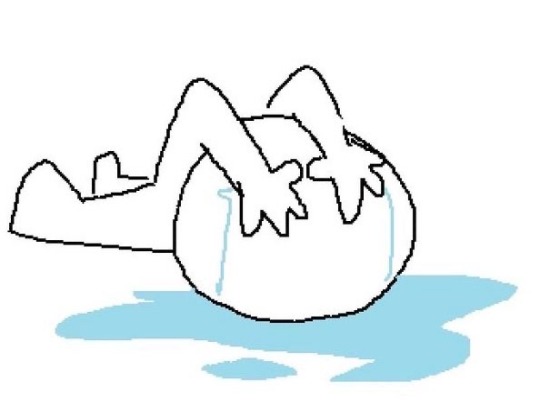
“Don’t give up on me Ben” this quote just wrecks me every single time-
#every single time I read it I feel that flutter in my heart#my heart just breaks for them😭😭#and I know it works out for them in the end#it’s just they had to be apart for so long aND UNDER THOSE CIRCUMSTANCES!!!!#my benmars😭 they didn’t deserve that#although it did give Ben that final push he needed to realize his feelings for mars#but at what cost#anyway#i love them more than life#benmars#benedikt montagov#marshall seo#these violent delights#our violent ends#last violent call#chloe gong#these violent delights quotes
26 notes
·
View notes
Text
"the stars incline us, they do not bind us."

-these violent delights, chloe gong. page 360
#hahahaha guys#look at me#i am so aesthetic#😨😨😨#these violent delights#our violent ends#these violent delights duology#foul lady fortune#chloe gong#foul heart huntsman#roma x juliette#roma montagov#julliette cai#my phone is on 5%#books#book aesthetic#quotes#book quotes#these violent delights quotes#these violent delights aesthetic
27 notes
·
View notes
Text
Sighing Y/N dug out a lighter from their pocket. To keep their hands occupied, realising the flame, then quenching it.
Y/N: "Want?"
Ghost responded by pulling out a cigarette tucked away within the folds of his clothing..
Ghost: You dont even smoke. Why do you carry that thing around?
Y/N: You know me. running around. Living life. Committing arson.
#incorrect call of duty quotes#cod quotes#incorrect cod quotes#cod ghost#ghost x y/n#if anyone is curious book title form where the quote is: These Violent Delights#call of duty headcannons
628 notes
·
View notes
Text
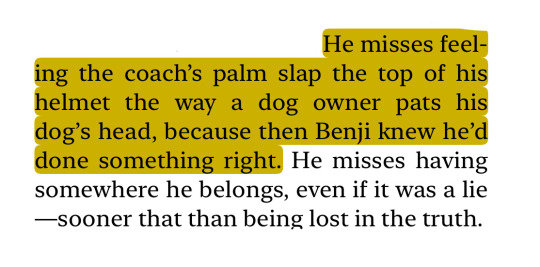

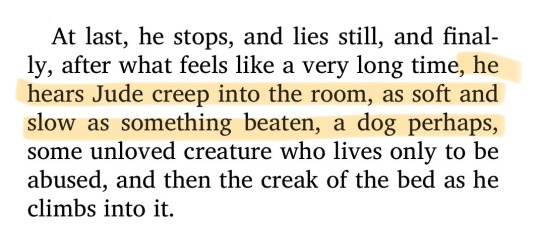

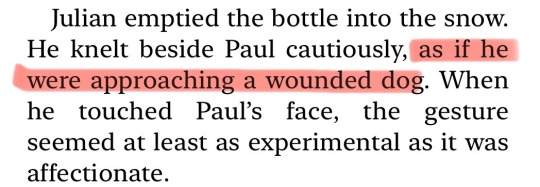
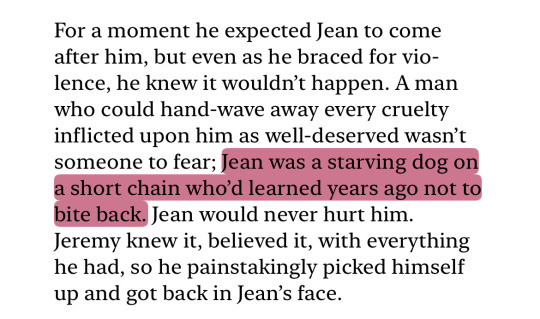
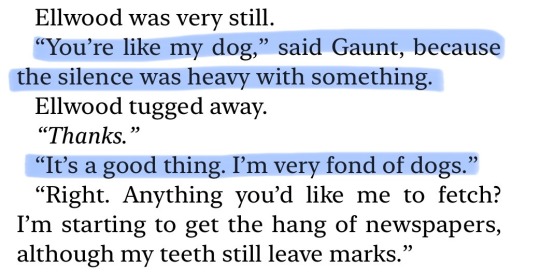
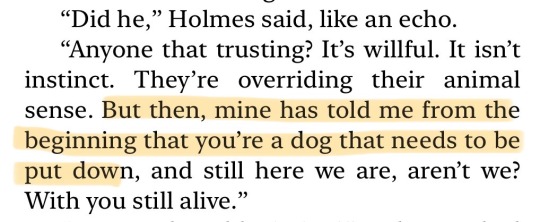

woof
the winners - fredrik backman / written on the body - jeanette winterson / a little life - hanya yanagihara / the dream thieves - maggie stiefvater / these violent delights - micah nemerever / the sunshine court - nora sakavic / in memorium - alice winn / the case for jamie - brittany cavallaro / shuggie bain - douglas stuart
#dog motif#beartown#written on the body#a little life#the dream thieves#the winners#web weaving#shuggie bain#these violent delights#the sunshine court#the case for jamie#in memoriam#the raven cycle#all for the game#benji ovich#ronan lynch#jude st francis#paul fleischer#jean moreau#fredrik backman#quotes#dog quotes
457 notes
·
View notes
Text
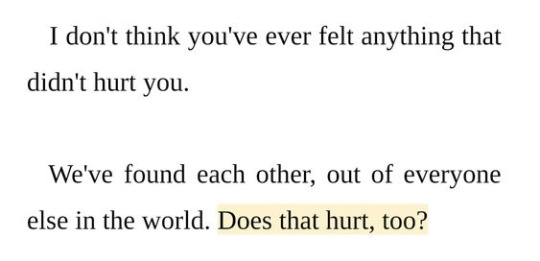
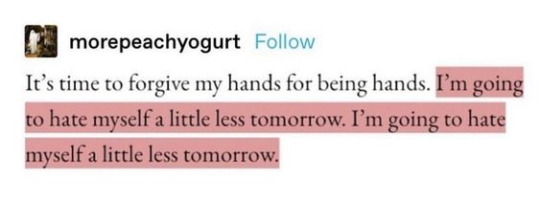
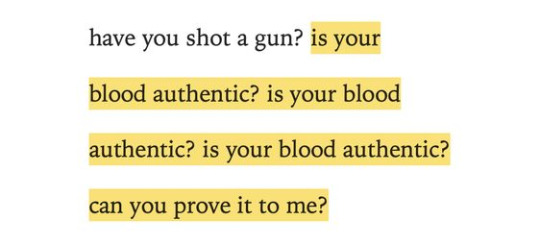


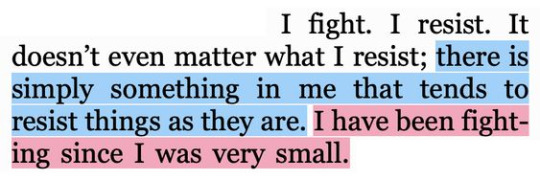

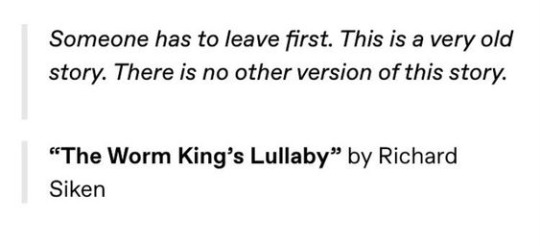

i think my body is falling in pieces i think my blood is passing me by
Micah Nemerever These Violent Delights / I.B. Vyache Excerpt 07.01.21 / Silas Denver Melvin excerpt from Grit: A Poetry Collection / Christa Wolf excerpt from Cassandra: A Novel and Four Essays / Ethel Cain Family Tree (Intro) / unknown / Fiona Apple Left Alone / Richard Siken The Worm King's Lullaby / Gwen Benaway Holy Wild
i. Micah Nemerever, These Violent Nights
[ "I don't think you've ever felt anything that didn't hurt you. / We've found each other, out of everyone else in the world. Does that hurt, too?" ]
ii. I.B. Vyache, Excerpt 07.01.21
[ "It's time to forgive my hands for being hands. I'm going to hate myself a little less tomorrow. I'm going to hate myself a little less tomorrow." ]
iii. unknown
[ "have you shot a gun? is your blood authentic? is your blood authentic? is your blood authentic? can you prove it to me?" ]
iv. Christa Wolf, Cassandra: A Novel and Four Essays
[ "You looked at me / (did you still see me?)" ]
v. Ethel Cain, Family Tree (Intro)
[ "The fate's already fucked me sideways / Swinging by my neck from the family tree / He'll laugh and say, 'You know I raised you better than this' / Then leave me hanging so they all can laugh at me" ]
vi. unknown
[ "I fight. I resist. It doesn't even matter what I resist; there is simply something in me that tends to resist things as they are. I have been fighting since I was very small." ]
vii. Fiona Apple, Left Alone
[ "[Chorus] / How can I ask anyone to love me / When all I do is beg to be left alone?" ]
viii. Richard Siken, The Worm King's Lullaby
[ "Someone has to leave first. This is a very old story. There is no other version of this story." ]
ix. Gwen Benaway, Holy Wild
[ "I am tired of explaining the fire, / it burns because it must." ]
#on loss#on loneliness#on sadness#on emotion#these are kinda just a mix of my most recent favs lmao#poetry#poem#words#writing#text#quote#web weave#web weaving#poetry web weave#poetry web weaving#chloe gong#these violent delights#ib vyache#excerpt 07.01.21#christa wolf#cassandra: a novel & four essays#ethel cain#family tree#fiona apple#left alone#richard siken#the worm king's lullaby#gwen benaway#holy wild#spilled thoughts
3K notes
·
View notes
Text
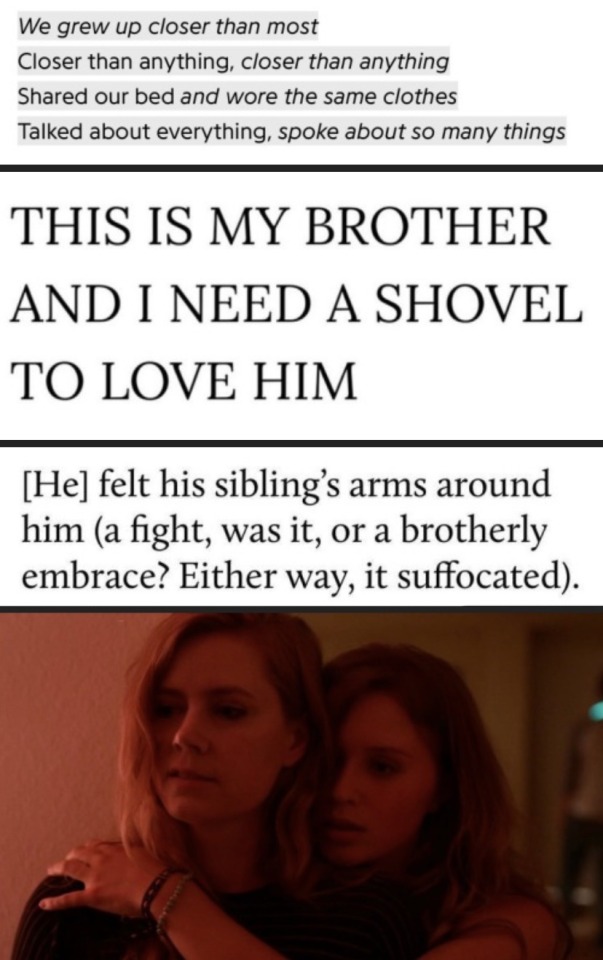
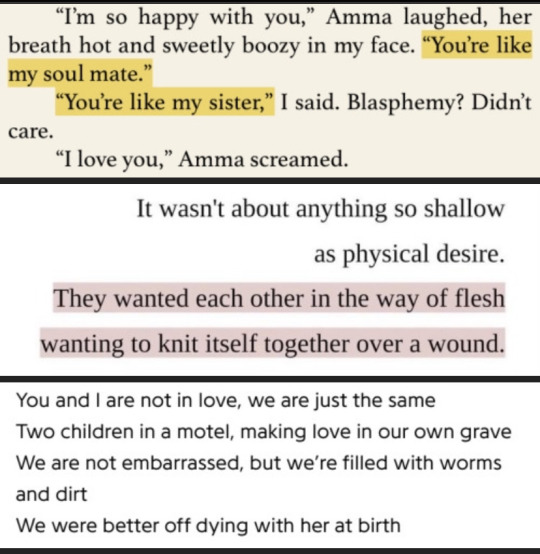
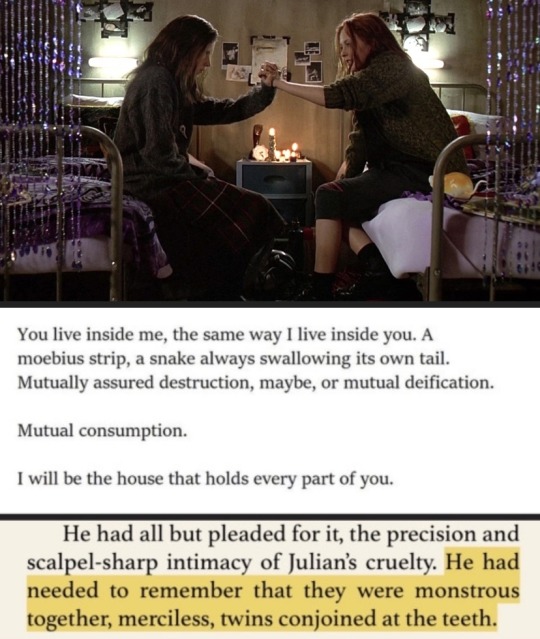
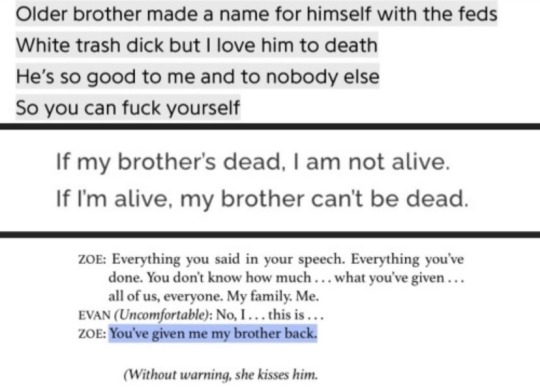
on being siblings.
evelyn, evelyn / natalie diaz / clive baker / sharp objects / gillian flynn / micah nemerever / ethel cain / ginger snaps / mabel: matryoska / dear evan hansen
#web weaving#quotes#datvd#these violent delights#micah nemerever#sharp objects#gillian flynn#camille preaker#amma crellin#ethel cain#dear evan hansen#zoe murphy#connor murphy#evan hansen#sibling relationship#siblings
1K notes
·
View notes
Text
Teacher: Your child was in a fight.
Roma: Oh no, that’s terrible!
Juliette: Did they win?
#incorrect quotes#chloe gong#secret shanghai#foul lady fortune#foul heart huntsman#these violent delights#our violent ends#juliette cai#roma montagov#romajuliette
106 notes
·
View notes
Text





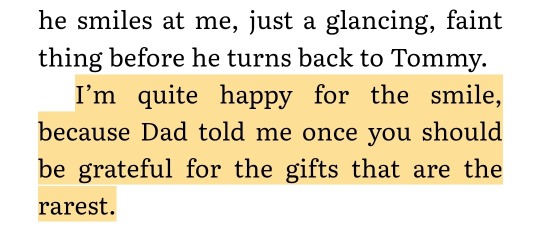
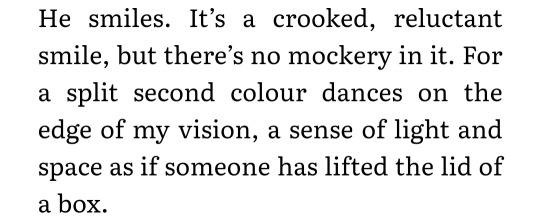
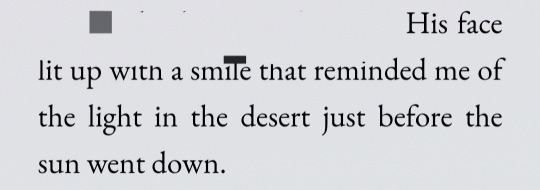

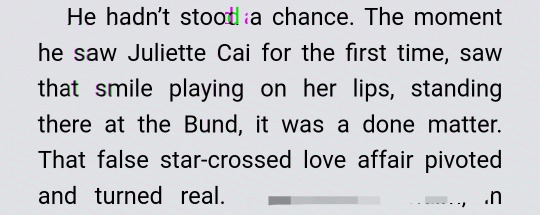
SMILE pt. 1
Brandon Sanderson, Words of Radiance // M. L. Wang, The Sword Of Kaigen // Leigh Bardugo, Six of Crows // Maggie Stiefvater, Blue Lily Lily Blue // Maggie Stiefvater, Blue Lily Lily Blue // Maggie Stiefvater, The Scorpio Races // Bridget Collins, The Binding // Benjamin Aliré Saenz, Aristotle and Dante Dive into the Waters of the World // Rainbow Rowell, Any Way the Wind Blows // Chloe Gong, Our Violent Ends
#web weaving#webs#parallels#book quotes#she smiled#words of radiance#brandon sanderson#the sword of kaigen#maggie stiefvater#bllb#the scorpio races#the binding#six of crows#kaz brekker#leigh bardugo#aristotle and dante#our violent ends#our violent delights
252 notes
·
View notes
Text
'I flirted with the idea that instead of being trans that I was just a cross-dresser (a quirk, I thought, that could be quietly folded into an otherwise average life) and that my dysphoria was sexual in nature, and sexual only. And if my feelings were only sexual, then, I wondered, perhaps I wasn’t actually trans.
I had read about a book called The Man Who Would Be Queen, by a Northwestern University professor who believed that transwomen who were attracted to women were really confused fetishists, they wanted to be women to satisfy an autogynephilia. And though I first read about this book in the context of its debunkment and disparagement, I thought about the electricity of slipping on those tights, zipping up those boots, and a stream of guilt followed. Maybe this professor was right, and maybe I was only a fetishist. Not trans, just a misguided boy.
About a year later, on the Internet, I come across a transwoman who added a unique message to the crowd refuting this professor. Oh, I wish I remember who this woman was, and I wish even more that I could do better than paraphrase her, but I remember her saying something like this: “Well, of course I feel sexy putting on women’s clothing and having a woman’s body. If you feel comfortable in your body for the first time, won’t that probably mean it’ll be the first time you feel comfortable, too, with delighting in your body as a sexual thing?”'
-Casey Plett, Consciousness
#this quote always moves me almost to tears when i remember it#i'm not a trans woman and i don't share the author's specific experiences with transition#but it really moves me that she frame transition as joyfully giving yourself permission to approach your body#not as something that has to be disciplined and deprived and made small in all these various ways#but as a means for experiencing pleasure and joy and delight and for insisting that our feelings and desires are worth#valuing and exploring and treasuring#i always used to think of prioritizing those things for myself as selfish and irresponsible#but who does it harm to want to experience pleasure in your own body?#it's such a beautifully simple and powerful switch to have flip in your head#and equally why are we forced to deny our own pleasure in transition and anything else related to our bodies in the name of moral rectitude#this is why i get so confused and pissed off when other trans people are fatphobic for example#like why are you so invested in politics of shame and disgust that never had any purpose other than#violently disciplining people as if they've violated moral codes by existing in a body#to say nothing of white people being racist in gay and trans communities#like again this system of violence is foundational to homophobia and transphobia#so why are you acting like it has nothing to do with you#even if you are unmoved by the urgency of other people's suffering which btw you should be moved by#what do you hope to gain by acting a collaborator and handmaiden to those systems#Casey Plett#she really is one of my favorite authors i wish more non-canadians read her#this quote is from a series of columns she did ont transition and every single one is a banger#i love when she talks about the people-pleasing elements of dysphoria and transition denial#she's so sharp about noting how many of us deny our own dysphoria on the grounds that others like and validate our bodies#that's how i always felt during my cis conventionally feminine era#it pleased other people so much and also that reception felt so hollow and joyless to me because i hated it#i get less of that positive feedback but that feels so unimportant next to the joy and pleasure i get to experience#said with the understanding that i'm very privileged in being able to prioritize those things without fear. but it was a switch flip#personal nonsense
129 notes
·
View notes
Text
you will always be in your mother’s house, no matter the time that has passed between now and when you first left it. you find that your arms take precedence to all the rest of you, for she never stopped needing to be held. she comes to you in the night like a child begging to crawl into your bed: your mother, your daughter, your burden, your burden, your burden, your fault. you can’t remember the last time you saw her smile. your tongue is the only muscle that works harder than your heart, you need it to break her down just as she does you, to level the playing field before inevitably letting her win again. she’s screaming I CAN’T HELP YOU RIGHT NOW as she slams the door in your face and you’re screaming back YOU NEVER COULD, YOU NEVER COULD as you throw it open again. you both draw lines and then cross them. you’re both afraid of your rage. you wonder how much of her resides inside you, how many pieces you can pull out of yourself if you just keep pushing at them like loose teeth. you call her on the side of the road and she tells you i can’t deal with this before hanging up the phone. she calls you from her 300k house and you leave your second job to drive her to rehab. you clean her house, pack her things, let the air out of her goddamn tires & manage to avoid looking at her like she’s crazy; five hours of labor and a termination letter just for her to pick a fight over a joint as you’re finally backing out of the driveway. she’s slamming her hands against the window, ripping at the door handle, screaming that you’re trying to force her to go, saying IT WAS MY IDEA, IT WAS MY IDEA, LET ME OUT so now you’re both getting out and you can hear your roommate say get your fucking shit out of my goddamn car then as you walk to your own. you scream and you cry and you slam your fists against the steering wheel, the ceiling, the window, again and again and again and again until you’re tired of feeling like your mother, until there’s nothing left in you to feel at all. so now it’s 5am and you’re watching in silence as your roommate tosses your mom’s belongings into the driveway. your heart is the facilitator of forgiveness, it’s what she’s going to play on when you think you’re finally going to stop picking up the phone. you think my mother has made mistakes, but so has god. she crawls into the passenger seat with tears in her eyes and asks you to help her carry her things back inside, asks you to drive her to go pick up her boyfriend, or at least just buy him a tank of gas. you pretend the rest of your body is insignificant, immovable, completely stationary and absolutely incapable of walking away. you let rigor mortis set in.
anatomy of the eldest daughter, Joan of Envy
#excerpts#literature#poetry#queer literature#quotes#unhinged#words#micah nemerever#these violent delights#cannibalism as a metaphor for love#richard siken
120 notes
·
View notes
Text






tell me that you're still mine, tell me that we'll be just fine...
these violent delights (romajuliette) headers. like or reblog if you save or use it. plss. 🪭
#these violent delights#these violent delights headers#our violent ends#our violent ends headers#romajuliette#romajuliette headers#juliette cai#juliette cai headers#roma montagov#roma montagov headers#roma x juliette#booktwt#bookstan#booktwitter#book headers#book quotes#book header#romance books#bluesky headers#quotes headers#chloe gong
24 notes
·
View notes
Text
These violent delights have violent ends
And in their triumph die, like fire and powder,
Which as they kiss consume. The sweetest honey
Is loathsome in his own deliciousness
And in the taste confounds the appetite.
Therefore love moderately; long love doth so;
Too swift arrives as tardy as too slow.
William Shakespeare, Romeo and Juliet
#dark academia#romantic academia#bookish#booklover#classic academia#books & libraries#book quotes#shakespeare quotes#classic literature#classic lit quotes#literature quotes#literature academia#william shakespeare#Shakespeare#romeo and juliet#these violent delights#these violent ends
139 notes
·
View notes
Text
Eyes, Look Your Last: Benedikt Montagov's Struggle with Life, Death, and Grief
(Word Count: 3,072)
((Tagging @thebenediktmontagov because I know you've been waiting for this one))
~~~
Throughout the Secret Shanghai series, life and death are obviously major themes, especially in the first two books. After all, Romeo and Juliet is very famously a tragedy. But in my humble opinion, there are few characters in these books who represent life, death, and the journey through grief better than Benedikt Montagov. He goes through a very traceable arc regarding this subject over the course of specifically Our Violent Ends; that book and that storyline are what we’re going to be looking at in this analysis.
Let’s start with the beginning of the book, Chapter 2 in particular, which is the earliest point that we see Benedikt. At this point, given that the book covers the span of a few months, it hasn’t been very long since Marshall’s assumed death. The wound is still very fresh, especially for Benedikt, as is made evident in this description of him (the first one we see in the book): “Benedikt Montagov was a wholly different person these days, all gloom and dark frowns. He may not have been the happiest person a few months ago, either, but he lacked a certain light in his eyes now that made him seem like a complete marionette, moving through the world at command. Mourning periods in this city were often short affairs. They came in rapid succession, like cinema showings ushered in and out of the theater to make room for the new. Benedikt was not only in mourning. He was half-dead himself,” (Our Violent Ends, Chapter 2). As stated there, Benedikt was never the happiest or most energetic person. And yet, the loss of Marshall has still caused such a serious dive in his mood and behavior that it’s extremely evident to the people around him. This excerpt uses very effective descriptive language, specifically referring to Benedikt as a “marionette”. This creates an immediate mental image in the mind of the reader of someone who is essentially being dragged through the world, not by their own will, but simply because they are being made to go on. In addition to this, the sheer lifeless quality of a marionette emphasizes just how much of a shell of himself Benedikt has become.
Not only does this change in personality have an impact on him, it also affects the people around him. Primarily, we see this within the same chapter from which I pulled the previous quote. A good example is this interaction between Roma and Alisa: “His frustrated insult was drowned out by the slam of the front door. Silence. “I just wanted to cheer him up,” Alisa said quietly. Roma sighed. “I know. It’s not your fault. He’s… having some difficulties.” “Because Marshall is dead,”” (Our Violent Ends, Chapter 2). Just before this exchange, Benedikt is shown being rather callous to both Roma and Alisa, two people who he cares very much about. They both understand that this behavior is not any fault of their own, but that doesn’t stop them from feeling hurt by it. Of course, this can’t be entirely attributed to Benedikt either; he is acting irrationally, and drastically out of character, because he isn’t able to properly cope with what has happened. He isn’t necessarily doing it intentionally, he’s simply lashing out because the anger and sadness that he feels has nowhere else to go. Benedikt is responsible for his own actions, but his loved ones also understand that he wouldn’t normally behave this way; these are unusual circumstances.
A few chapters later, in the first section in the book where we are given Benedikt’s perspective, we learn more about what he’s been dealing with while not around other people. If anger is the primary emotion he expresses in his interactions with others, sadness is much more in the foreground when he is alone. The narration in Chapter 5 describes a specific event that took place while he was home alone in the apartment he and Marshall previously shared: “One day he had been operating in numbness, shoving aside the art supplies abandoned on the floor and going through each step of his routine with hardly any trouble. The next moment, he entered the kitchen and could not stop staring at the stovetop. The water started boiling and still he could not look away, until he merely crumpled to the floor, sobbing into his hands as the water evaporated into nothingness,” (Our Violent Ends, Chapter 5). He is so severely affected by the loss of Marshall that he can barely enter the kitchen without being brought to debilitating tears by the reminder of Marshall’s absence. In fact, he is almost unable to eat at all anymore. His own home no longer feels safe and comfortable to him, instead it has become full of painful memories. He no longer has anywhere to go where he can feel at peace, because he is no longer capable of feeling peaceful.
And yet, he remains very hesitant to express any of his sadness to the people close to him. Rather than at any point allowing himself to be comforted, or ever showing an ounce of vulnerability, he conceals that entire portion of his feelings with much sharper edges. He uses anger and violence to hide any part of his grieving that he doesn’t want others to see. Juliette states in the very first chapter of the book that members of the Scarlet Gang have been killed, with a clear motive of avenging Marshall’s death: “She already knew that, of course, from the reports that came back to her about dead gangsters with Korean characters slashed in blood beside them,” (Our Violent Ends, Chapter 1). At the time of this quote, she is speaking about the changes she has noticed in Roma’s behavior. However, later on in the book it is actually implied that Benedikt was responsible for many of these killings when he says that he “...slaughtered Scarlets in [Marshall’s] name,” (Our Violent Ends, Chapter 25). In the privacy of his own home, he expresses his grief through immense sadness. What he feels is more appropriate to bring into the view of others, though, is not sorrow, but gruesome violence. He is unwilling to show any vulnerability, even to those he trusts.
Later on in Chapter 5, we also see another new aspect of Benedikt’s mourning that continues through the rest of the book: his near complete loss of concern for his own life. This first appears here, as he enters a conflict with a large group of Scarlets: “The smarter move would have been to run when he was vastly outnumbered, but he cared little. He had no reason to care, to live—” (Our Violent Ends, Chapter 5). He is behaving recklessly because he feels that, with the death of Marshall, he has lost all reason to continue to live. This can be brought back to the metaphor of the marionette from earlier, in that he no longer cares to continue to exist, even though he still does. He is still alive only because no one has killed him yet; if someone were to try to, he suggests that he would put up no fight. But this is contested just a few sentences later, when he actually has a gun to his head: “No, he thought suddenly, his eyes squeezing shut. Wait, I didn't actually want to die, not yet, not really…” (Our Violent Ends, Chapter 5). Once he is actually faced with his own death in a real way, he becomes frightened. He isn’t truly apathetic towards his life, he has only convinced himself that he is. The truth of the matter is that he does still have things to live for. The hopelessness that has consumed him isn’t final, and this is the first hint that we as readers see of his capacity to change again.
This is not the end of his ruminations on death, though. Another notable instance is during the fight with the Scarlets after they set the fire, when Benedikt enters the fray despite Roma discouraging him from doing so. When he ends up in a life-threatening position, his thoughts stray to the death of his mother: “He knew that after she was killed—an accidental casualty of a shoot-out—they had burned her body right in an alleyway until only charred smithereens remained. Maybe this was the way he would join her. The Scarlets would kill him, then throw him right into the raging fire—ashes to ashes, dust to dust,” (Our Violent Ends, Chapter 19). He has once again started to think about how and when his own death might occur, something we don’t really see at all prior to Marshall’s death. Here he also compares the possibility of his own death to the death of his mother, emphasizing the cyclic nature of the death that Benedikt has been faced with in his life.
Benedikt’s blatant disregard for himself and his life are also displayed in a different way later on. The first time we see it, he is boldly declaring that he has no reason to live. In the later instance, which takes place in Chapter 20 of the book, this is what is described: “With a ragged inhale, Benedikt yanked a new jacket out of his wardrobe and tugged it on, hardly bothering to go easy on his throbbing shoulder. What was the point? What was one more point of pain against the whole smorgasbord? He was a damn walking collection point for grievances and grief,” (Our Violent Ends, Chapter 20). Here, he isn’t outright saying that he wants to be dead, but he still acts carelessly with himself. He doesn’t care about causing himself pain, because he sees any effort to prevent it as futile. He believes that it doesn’t matter if something causes him pain or not, since either way, he is still experiencing pain from other sources. What he’s essentially saying here is that one more bit of hurt added to the pile won’t make any difference. We as the audience know that he isn’t correct, and that he really is just making things worse, but he himself doesn’t realize that yet - or care enough to consider it.
In addition to Benedikt’s apathy towards keeping himself alive, there are also more examples of his recklessness with the lives of others. There is the instance mentioned above, where it is suggested that he goes on a spree of revenge killings, but we also get a more specific line from Juliette that illustrates this much more clearly: “Benedikt was not like Roma. He had no hesitation with her life,” (Our Violent Ends, Chapter 24). Juliette knows that, even though Roma is in mourning as well, he has no true desire to kill her. In this moment, though, as Benedikt points a gun at her, she recognizes the danger she is actually in. Benedikt’s primary motivation throughout the majority of Our Violent Ends is to get revenge, specifically on Juliette. He makes it very clear multiple times that he wants her dead, whether Roma does it or not. This is a pivotal scene for Benedikt. As Juliette mentions, he would have had no hesitation in killing her. If he had actually gone through with it, he likely would’ve effectively ruined his own life. Not only would he have experienced the same rage from Roma that he himself had previously directed at Juliette, he also probably would have never found out that Marshall was alive (at least not for a much longer time, if at all), and it’s entirely possible that he would’ve continued spiraling into a life entirely made up of violence. Frankly, he is lucky that Juliette was able to stop him when she did; her quick thinking - and knowledge that she couldn’t keep her secret any longer - was the beginning of his climb back up from rock bottom. If you imagine his descent into darkness as a V-shaped line, this moment is the vertex: the only way left to go is up.
That scene is a major turning point in Benedikt’s character arc, but the first true change happens in the next chapter, when he is first able to see Marshall again: “He had expected to explode outward, to at last rid the darkness in his chest by seeking revenge and directing a very sharp object at Juliette. Instead, the darkness had turned to light, and now he was an overwrought light bulb, close to implosion when the vacuum space inside shattered,” (Our Violent Ends, Chapter 25). This excerpt is indicative of a very abrupt change for Benedikt. While before he was overcome with anger, sadness, and a desire for revenge, all of that has suddenly vanished. The language used here makes it seem almost brutal, like the extreme emotional shift he’s experiencing is too overwhelming to process. In an instant, the entire purpose he’s created for himself over the past few months has become completely pointless. For a brief moment, he feels lost, because the one thing that still drove him to keep going has totally disappeared. But, similarly to how one adjusts to cold water after being unexpectedly thrown in, he quickly realizes that his original reason to live has miraculously returned. As it describes in the quote above (and references the very first one I used, which mentions the “light in his eyes” that has disappeared), the darkness that had overtaken him is gone, and that original light is back. To return to the comparison of the V-shaped line, this part would be the very top of the line.
From this point on, Benedikt’s improved mood continues. There are moments where it wavers, of course, but he is generally much more hopeful for the remainder of the book. We can also see another parallel here to the beginning of the book, exemplified by this dialogue between Benedikt and Roma: ““You look better today,” Roma remarked, starting in the direction of headquarters. “Are you getting more sleep?” “Yes,” Benedikt replied plainly. And mere hours ago, I found out that Marshall is still alive. He wanted to say it aloud. He wanted to scream it from the rooftops and declare it to the whole world, so that the world could end its mourning with him,” (Our Violent Ends, Chapter 26). At the beginning of this essay, I mentioned the fact that Benedikt’s downward shift in mood and behavior is very noticeable to the people around him. This also applies here. Benedikt mentions that it has only been hours since he found out Marshall was alive, and yet Roma already notices a distinct change in not only his mood, but presumably his physical appearance as well. Roma attributes it to getting more sleep, but the truth is that simply having the knowledge that Marshall is alive has improved Benedikt’s mental state so much that it has caused a physical change. His period of mourning, which was said to have seemed permanent, is officially over.
At this point, Benedikt’s arc in the story (at least in relation to grief and death) is pretty much over. He has gone through all of the development that he can, and has reached the light at the end of the tunnel. Still, there is one very important full-circle moment later on that I want to include, just to bring the point home. Near the end of the book, Roma is made to believe that Juliette has died - as is expected of a Romeo and Juliet retelling. Roma instantly falls into a downward spiral in which he wants to either get revenge for Juliette’s death, or die with her. Given that you’ve presumably read the rest of my analysis up to this point, this should sound familiar, and Benedikt thinks so too: “The strangest thing was that Benedikt recognized himself in [Roma’s] expression, recognized that same twisted sense of rage that showed itself in recklessness. Is that what I looked like?” (Our Violent Ends, Chapter 39). Benedikt no longer feels what Roma is feeling, but he’s now being faced with a mirror image of exactly what he was like when he did. The only difference is that now, Benedikt can see that version of himself through a much more hopeful lens. For the entire duration of Roma’s panic following Juliette’s supposed death, Benedikt remains steadfast in his insistence that everything is going to be alright. He reminds Roma that Marshall came back even after Benedikt thought he had died, and when Juliette comes back as well, he says this: ““Look,” Benedikt said faintly, hardly hearing his own words as they slipped out. “You got your resurrection too,”” (Our Violent Ends, Chapter 39). Benedikt has come so far since the beginning of the book that he is able to believe that the impossible - someone being brought back from the dead - can happen not once, but twice. And yes, neither Marshall nor Juliette were ever actually dead, but the point still stands: who would ever have assumed that she would use the same trick twice? Roma becomes despondent at the news of Juliette’s death, because he assumes it must be true. But Benedikt, who is presented within the book as perhaps being more inclined towards pessimism and hopelessness than Roma ever was, believes Juliette can still come back. And his newfound hope pays off. This single moment is possibly the best representation of Benedikt’s development that I could’ve asked for.
Benedikt Montagov is an extremely complex character, and I honestly feel like I could go on about him forever. If it weren’t for the amount of text that I expect people to want to read, maybe I would. But the most important thing I want people to take away from this entire analysis is just how well written Benedikt is as a character. His story, throughout not only Our Violent Ends but both books, is one that sticks in your head after you’ve read it. This entire aspect of his character was clearly crafted with a lot of care, and I felt that I needed to write this because I wanted to put emphasis on the parts of it that I don’t see discussed very often. If you’ve read this far, I really hope you enjoyed it, and that maybe it made you think about something you hadn’t considered before. I’m sure this won’t be the end of my ramblings about Benedikt, but for now, that’s all I have to say. Thank you for reading.
#guys they're real the coherent thoughts about benedikt montagov are real#the coherent thoughts only spoken of in myth#also i know the quote used in the title is actually from romeo but it sounded good so i used it#these violent delights#our violent ends#foul lady fortune#last violent call#foul heart huntsman#secret shanghai#chloe gong#benedikt montagov#marshall seo#benmars#roma montagov#juliette cai#alisa montagova#forgive me if there are any mistakes in here 🙏🙏🙏
30 notes
·
View notes
Text
When Chloe Gong said about Shanghai: "This place hums to the tune of debauchery. This city is filthy and deep in the thrall of unending sin, so saturated with the kiss of decadence that the sky threatens to buckle and crush all those living vivaciously beneath it in punishment."
And when R.F. Kuang said about London: "London was voracious, was growing fat on its spoils and still, somehow, starved. London was both unimaginably rich and wretchedly poor. London - lovely, ugly, sprawling, cramped, belching, sniffing, virtuous, hypocritical, silver-gilded London - was near to a reckoning, for the day would come when it either devoured itself from inside or cast outwards for new delicacies, labour, capital, and culture on which to feed."
Yeah. Authors describing cities is my new favourite thing.
#Book quotes#Chloe gong#these violent delights#our violent ends#Babel#rf kuang#Shanghai#London#Booklr#My original post
421 notes
·
View notes
Text
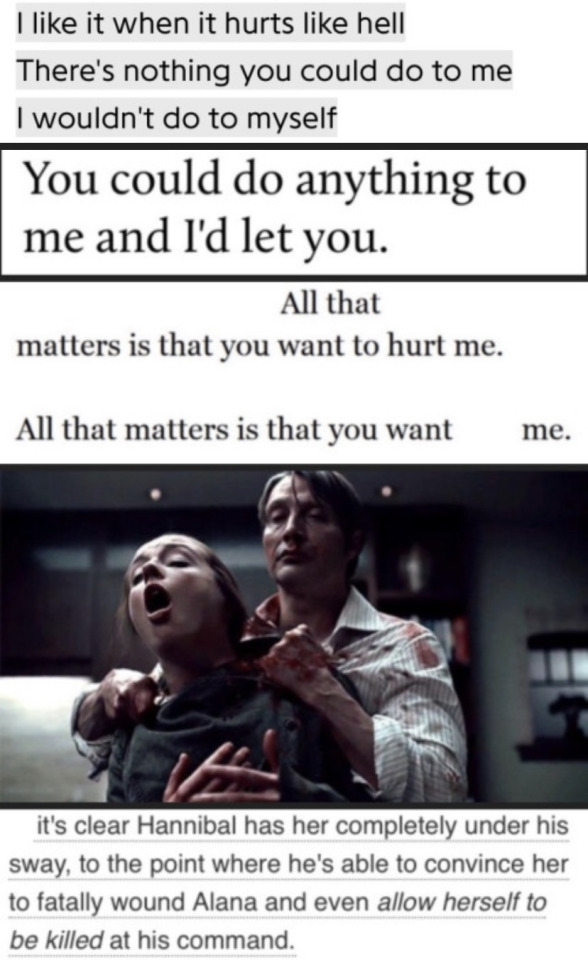

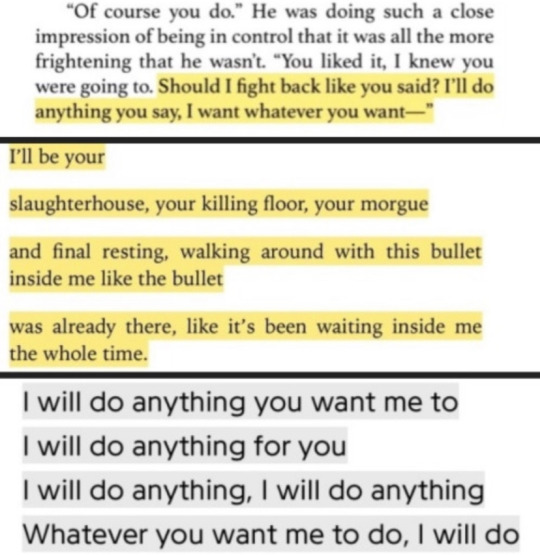
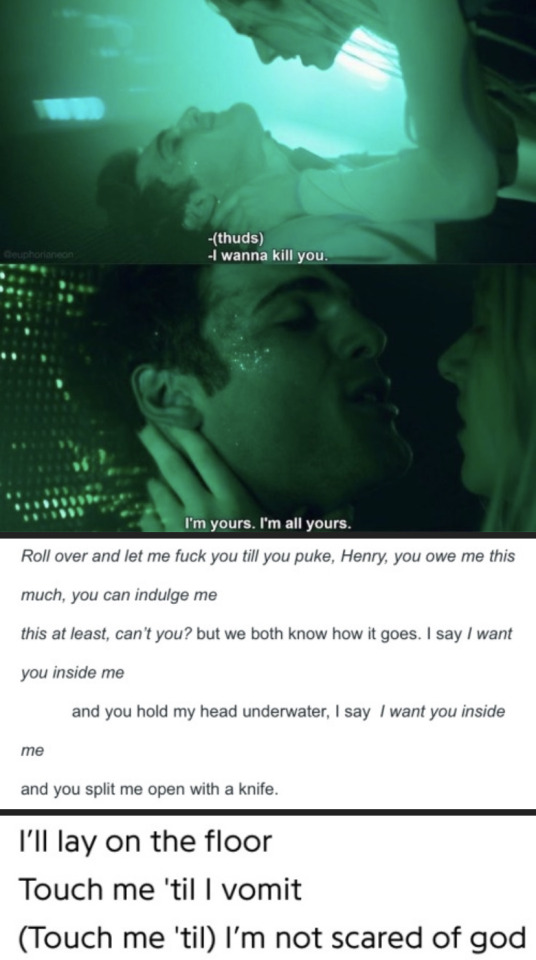
and i love you so much, i’m going to let you kill me.
nicole dollanganger / micah nemerever / yves olade / hannibal / tvtropes / florence and the machine / ada limón / richard siken / phoebe bridgers / euphoria / ethel cain
#yes this concept has been done a lot but i still love it#web weaving#quotes#poetry#nicole dollanganger#micah nemerever#yves olade#these violent delights#datvd#paul fleischer#julian fromme#hannibal#nbc hannibal#abigail hobbs#hannibal lecter#florence and the machine#ada limón#richard siken#phoebe bridgers#ethel cain
352 notes
·
View notes
Text
Celia: Oh gosh, I wish I got more sleep. I only got six hours!
Orion: Six? I only got three!
Alisa: You guys got sleep?
Rosalind comes stumbling out of her room and grabs a jug of coffee before saying: What year is it??
#incorrect quotes#chloe gong#secret shanghai#foul lady fortune#foul heart huntsman#these violent delights#our violent ends#orion hong#rosalind lang#alisa montagova#celia lang
47 notes
·
View notes